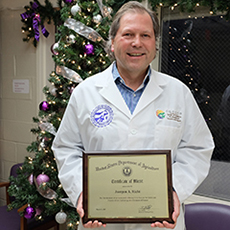December 12, 2019
CEEZAD director Richt shares regional award for work on swine flu vaccine
Submitted by Communications and Marketing

The director of the Center of Excellence For Emerging and Zoonotic Animal Diseases at the Kansas State University College of Veterinary Medicine is a recipient of an award for his work in technology transfer.
Jürgen Richt, Regents distinguished professor of diagnostic medicine and pathobiology and KBA eminent scholar, and Kelly Lager with the U.S. Department of Agriculture received the Agricultural Research Service Midwest Area Award for Excellence in Technology Transfer for research on swine influenza vaccines.
The two were recognized by the USDA's Midwest Agricultural Research Service for their work on development of a new vaccine against swine flu, a disease of pigs that causes up to $150 million in damage to the U.S. pork production industry annually. The vaccine, which is sold under the trade name Ingelvac ProvenzaTM, is licensed to Boehringer Ingelheim Vetmedica Inc.
The vaccine can be used in newborn piglets even in the presence of maternal influenza antibodies.
To address the need for an improved vaccine against swine flu, ARS scientists teamed up with researchers at the Icahn School of Medicine at Mount Sinai and the St. Jude Children's Research Hospital to develop and demonstrate the efficacy of the first attenuated live influenza A virus vaccine for use in swine.
U.S. and foreign patent applications were filed for this technology, which were subsequently licensed to Boehringer Ingelheim Vetmedica. Because this was a unique platform for swine influenza A vaccines, additional experimentation to demonstrate safety and efficacy was required for approval by the USDA Animal and Plant Health Inspection Service's Center for Veterinary Biologics for the attenuated live virus vaccine.
Boehringer Ingelheim Vetmedica subsequently launched the commercial vaccine in 2018.
Richt was particularly recognized for his expertise in zoonotic virus research and molecular skills, which were necessary to complete the in vitrostudies to demonstrate attenuation and replication efficacy of the influenza vaccine construct. He was also recognized for his involvement in the vivo studies that demonstrated the attenuation, efficacy and utility of the influenza vaccine prototype.
Beyond that, he also contributed to the technology transfer efforts through completing additional studies supporting the safety and efficacy and potential application of the influenza vaccine prototype and transferred the results through scientific publications, as well as oral presentations at scientific and stakeholder meetings.
